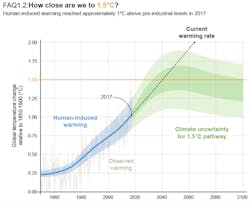Excuse the pun, but climate change just became even hotter, both literally and as an issue.
By now, many (or most) of you have probably read the new report recently issued by the United Nation’s Intergovernmental Panel on Climate Change (IPCC). Regardless of your feelings about the UN and climate change in general, the science behind this report transcends politics. The IPCC is composed of thousands of climate scientists from more than a hundred countries, and the panel’s working groups are supported by Technical Support Units, currently from renowned academic institutions in France (Université Paris Saclay), Germany (Alfred-Wegener-Institute), the UK (Imperial College London), and Japan (Institute for Global Environmental Strategies).
Just last month, I once again wrote about climate change and its associated sea level rise, but this time from the perspective of adaptation rather than mitigation. I pointed out that, as an energy and sustainability consultant, most of my professional efforts were focused on various mitigation strategies – such as energy efficiency and renewal energy technologies – intended to reduce greenhouse gas (GHG) emissions, but that the continuing increase in severe weather events necessitated more immediate efforts at improving our nation’s (and the world’s) resiliency. However, the IPCC report, released Oct. 8, puts the emphasis back on mitigation. According to the report, the previous global warming temperature target of 2 deg. C (3.6 deg. F) or less is no longer acceptable, and anything higher than a 1.5 deg. C (2.7 deg. F) increase by 2030 would “significantly worsen the risks of drought, floods, extreme heat and poverty for hundreds of millions of people.”
Although the issue is based in science, the solution will require both technology and political will. GHG emissions must be drastically reduced, which will require ending our dependence on fossil fuels and implementing widespread renewal energy solutions. The scientific community cannot solve this problem by itself, it will require urgent action by the world’s governments.
Memo to Acting EPA Administrator Andrew Wheeler: Call your office!
A regular contributor to HPAC Engineering and a member of its editorial advisory board, the author is a principal at Sustainable Performance Solutions LLC, a south Florida-based engineering firm focusing on energy and sustainability.
About the Author
Larry Clark
A member of HPAC Engineering’s Editorial Advisory Board, Lawrence (Larry) Clark, QCxP, GGP, LEED AP+, is principal of Sustainable Performance Solutions LLC, a South Florida-based engineering firm focused on energy and sustainability consulting. He has more than two dozen published articles on HVAC- and energy-related topics to his credit and frequently lectures on green-building best practices, central-energy-plant optimization, and demand-controlled ventilation.

